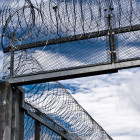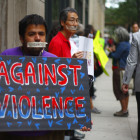
Southern States Lead Nation in Incarceration Rates
|
The new report raises serious questions about the impact of corrections on crime rates.
Juvenile Justice Information Exchange (https://jjie.org/tag/news-system/page/11/)

The new report raises serious questions about the impact of corrections on crime rates.

Teenagers in adult prison live with an endless series of violations on a daily basis, violations that I could only think to describe as “everyday rapes.”

The Abilene Paradox and "groupthink" -- decisions reached in a group based on social conformity that can lead to ineffective programs and practices in juvenile justice.

The de-emphasis of mental health funding is not an aberration across the United States. From 2009 until 2011, 31 states enacted major mental health budget cuts.

Without legal representation, young people “have no one to turn to whom they trust.”

Records suggest that pepper spray—called “OC” (short for “Oleoresin Capsicum”)— is deployed daily, sometimes multiple times a day, in San Diego county's juvenile facilities.

Upcoming cuts to juvenile justice system funding could increase racial disparities in the system.

Last week, the two highest ranking managers at the Shuman Juvenile Detention Center in Allegheny County, Penn. were fired, a county representative announced Thursday. The two fired employees, the detention center’s director, William Simmons, and deputy, Lynette Drawn-Williamson, had received suspensions earlier in the year. William Stickman, a public safety consultant who retired as Pennsylvania’s deputy secretary of corrections, will serve as the interim director of the facility, while certified public accountant Lillian Reese-McGhee has been appointed as the facility’s new deputy director, Allegheny County Executive Rich Fitzgerald announced. Following a poor inspection in May, Shuman has been operating under a provisional license from Pennsylvania’s Department of Public Welfare.

Grace Bauer had her entire world turned upside down when her son entered one of the nation’s harshest juvenile justice systems. Fueled by a burning desire to alter the system, she soon became one of the nation’s most impassioned crusaders for sweeping juvenile justice reform. Editor Note: This story is a continuation of the series Mental Health and the Juvenile Justice System: Progress, Problems and Paradoxes. Readers may also be interested in visiting the Juvenile Justice Resource HUB for more information about mental health and the juvenile justice system. --
The death of Grace Bauer's mother in 1998 triggered a cycle of grief that fully consumed her life for the better part of 15 years. “It became the mark we would measure time by,” she said. The pain, she said, was especially severe for her eldest child, Corey, who was 11 when his grandmother died.

A recent JJIE article titled "In Georgia, Sex Abuse Allegations Cloud Progress of Juvenile Justice Reform" is a story of contradictions -- in the midst of juvenile justice reform comes the federal report showing that Georgia has among the nation’s highest rates of sexual assaults in its secure juvenile facilities. The Atlanta Journal Constitution quoted my response -- "distressing." Although "distressing," these allegations do not "cloud" the progress of juvenile justice reform -- they underscore the reasons for reform. These stories aptly report "what" and provide some insight into "why" this distressing problem is occurring, but there is much more to the "why.” There is an elephant in the room -- the misuse and overuse of secure detention facilities. George Bernard Shaw wrote that "All great truths begin as blasphemies," and so, this is my blasphemy: We are making communities less safe by sending too many of the wrong kids to youth prison that turns them from the aggravating sort into the scary sort.